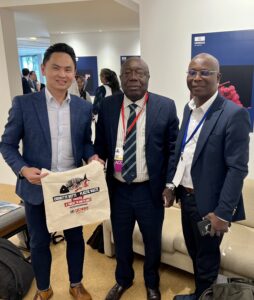ASH’s Policy Director Chris Bostic is attending the second Intergovernmental Negotiating Committee (INC-2) of the United Nations treaty to end plastic pollution in Paris, France from May 29 – June 2, 2023. He will share updates and progress here for our community to stay engaged and informed.

May 30, 2023 – Writing after 9:00 pm Paris time, Day 2 is not over, and the most important part of today is likely still ahead of us. In fact, it is almost certainly ahead of us, since nothing has been accomplished yet today. For these final few hours, the worst we can do is tie.
The holdup, like yesterday, is the rules of procedure. This may sound petty and an indication that some delegations are intentionally trying to sabotage the negotiations. But that is only half right; it’s not petty.
Prior to INC-2 the Committee adopted all the rules of procedure for the negotiations except for one, which was [bracketed] – how decisions will be made. The choice is simple. Either the Committee can work by consensus, or it can allow voting.
Consensus is a very positive word. We all seek consensus in our human interactions. A consensus decision means no one goes away particularly angry or disappointed, and we can all move forward together. It’s a kumbaya moment. But there is a dark side when consensus is the only acceptable way to reach a decision. It means everyone gets a veto. If the INC decides to work by consensus, 174 countries can agree on the best course of action and the remaining one can ruin it. And there is certainly more than one country here determined to ensure this treaty never sees the light of day. Consensus means we leave with the lowest common denominator.
There is another reason why voting is a better way forward – no country is forced to ratify treaties. If Saudi Arabia (to pick a purely random example) is unhappy with the final treaty text, it can simply refuse to ratify it and not be bound under international law.
The threat to our health and planet from plastic pollution – like cigarette butts – is real and beyond argument. There will always be those whose greed or near-sightedness leads them to block progress. But we can’t let them. Doing nothing is not a sane option.
Keep reading about ASH and the Stop Tobacco Pollution Alliance’s work on plastic pollution <Return to Day 1 Blog Advance to Day 3 Blog>








